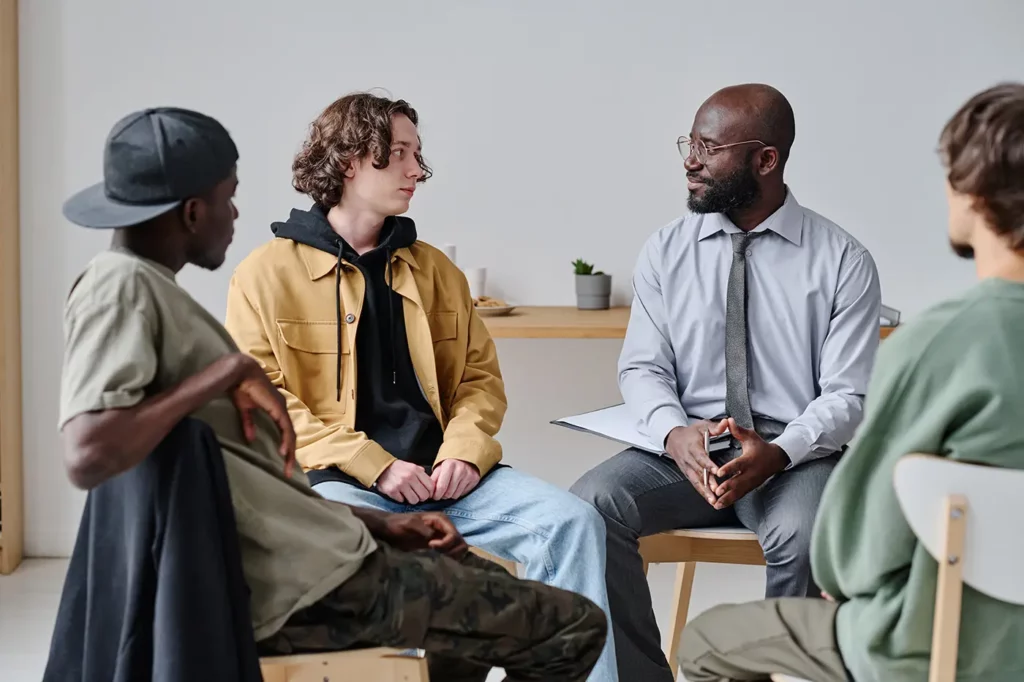What is Group Therapy?
Group therapy is a treatment option that sees people with relatable disorders meet together to discuss their experiences. Therapy groups are led by experienced therapists who help lead the conversations and provide helpful advice to each individual. Along with delivering a sense of community, group therapy gives participants accountability, encouragement, and new perspectives.
Group therapy is usually arranged for those dealing with mental health or addiction disorders. It offers a supportive environment where patients are able to develop healthy coping skills, build a support group, and create a roadmap to navigate challenges and enjoy a healthier future.
Atlantic Behavioral Health:
Leading Group Therapy Program Massachusetts Providers
Group therapy is an important component of our psychiatric day treatment program. The reason is simple: it is an effective treatment for those seeking help for mental health disorders such as anxiety, depression and gambling. A group setting helps patients to see they’re not alone in their fight towards recovery.
At Atlantic Behavioral Health, our reputable group therapy program gives you a supportive, safe space that is the ideal platform for working through your specific challenges. Our group meetings are led by a professional therapist who understands how to impart helpful advice and keep the conversations going and is well-versed in the unique challenges of recovery from mental health and addiction disorders.
We take great care in putting together all of our therapy groups. We want to keep these small in size to ensure all group members feel they are heard and involved. New members are also welcomed in without feeling disconnected from the rest of the group. Additionally, we offer a range of options with our support groups, which means there is a therapy choice that best matches your requirements and interests.
While individual therapy is always recommended for one-on-one support, we often suggest this is combined with group psychotherapy. With both therapy types working concurrently, you receive the full support and help required for your recovery.
Are you considering joining our adult group therapy IOS (intensive outpatient services) in Massachusetts? If so, check to see if you qualify, and then get in touch with us today. We can explain what to expect with our group therapy treatment, which makes getting started all that much easier.
Do I Qualify?
If you’re wondering about that, call us today. A member of our team will take your call and listen to your concerns and help you understand your options and whether you qualify for our mental health or psychiatric services.


The Group Therapy Process
To those who have never participated in a group therapy session before, the thought of doing so can be intimidating. Keep in mind this treatment is designed to be a welcoming, supportive therapeutic group where all clients are pushing towards the same recovery goals.
However, if you require a little more information to ease your fears, here is a breakdown of what a typical group therapy session covers:
- The therapy group meets in a private room. A therapist will take the lead and open discussion.
- The therapist begins by asking all participants to introduce themselves. This will also include a short description of why they have attended therapy.
- The topic of the day will then be brought up by the therapist. They will ask those in the group to explore different emotions, share their personal experiences, or practice new coping techniques.
- Although everyone is encouraged to get involved, it is never mandatory. If you don’t feel comfortable with sharing your story or opening up, you can sit back and simply take in what other members are saying.
- The session ends with the therapist asking participants if they have any questions or closing comments.
While you might be hesitant to share personal stories or describe your weaknesses, remember that all psychotherapy groups are confidential spaces. What is shared among the group remains within the group.
Types of Group Therapy
Not all group therapy courses are built the same. There are two main reasons that can dictate the therapy type used. One is the clinical method used. The other is the mental health condition that’s being treated. Here are some of the most common group therapy types:
Cognitive Behavioral Therapy Group
Cognitive behavioral therapy (CBT) centers on the identification of distorted behaviors, emotional responses, and thinking patterns. Once identified, the work is then focused on altering these distorted responses for the better. Psychoeducational groups will typically base their principles on CBT.
Dialectical Behavior Therapy Group
A type of talking therapy, dialectical behavior therapy (DBT), is provided both in a one-to-one setting and a group setting. A DBT skills group can be positive for those seeking to understand and accept their feelings, as participants are able to share their thoughts, listen, and empower each other.
Skills Development Group
When working with those who have developmental disabilities or disorders, a skills development group can often be used. This is used for enhancing social skills, communication skills, and so on.
Interpersonal Group
As the name suggests, this group type has a focus on building interpersonal relationships along with positive social interactions. Additionally, this includes covering the level of peer support, along with the impact these relationships – both positive and negative – have on your mindset.
The Importance of Group Therapy
Group therapy can play an integral role in the recovery of those with addiction and mental health disorders. These conditions can often make you feel isolated. For example, someone who stops consuming alcohol could miss the social aspects of visiting their local bar. With group therapy, individuals can feel less alone in their recovery.
As support groups are made up of people going through similar experiences, this therapy can also be helpful for learning from others and gaining new perspectives. This type of information may assist with your recovery, stopping you from making mistakes that others have made in the past.
You can also learn healthy coping mechanisms with group therapy. Experienced therapists will teach you how to face up to certain situations, where you can utilize techniques to get past them successfully and without relapsing.
Another major positive about group therapy is that you can build a strong support system. Each member helps to build each other up in this support system, where you can receive both accountability and encouragement as you progress in your recovery.
Improve self-esteem issues, eating disorders, obsessive-compulsive disorder, anxiety, stress, and more – there are many areas where group therapy can help improve the lives of peers. Join a group at our facility today and begin your road to recovery.


Looking to talk to someone?
At Atlantic Behavioral Health, Group Therapy is one of the key tools we use in providing psychiatric day treatment. If you like what you’ve seen so far, we encourage you to reach out to us today.







